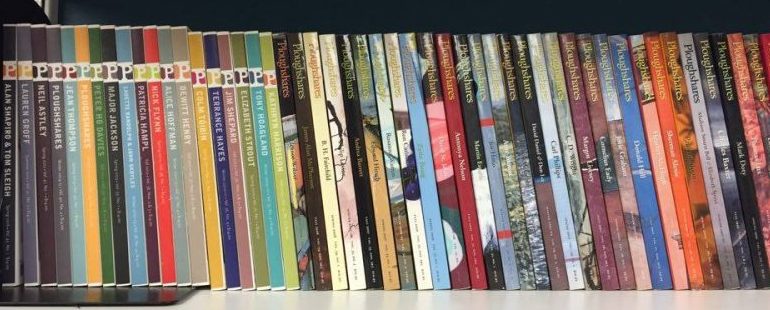In Both Directions: Elise Juska’s “Transfer Station”

When I started this series back in July, my plan was to write about a single Ploughshares story in each post, focusing on what each story might teach us about writing fiction. That a pattern in my story choice would emerge was unexpected. I’ve written a post about a woman who grieves for her husband eleven years after his death, and another about a man who goes to extreme measures to avoid grief altogether. I’ve recommended Max Porter’s novel Grief is the Thing with Feathers, which follows a man as he raises his two sons in the immediate aftermath of his wife’s death. And now Elise Juska’s “Transfer Station,” which begins four months after the protagonist’s wife dies from breast cancer. What gives?
It’s possible that Ploughshares publishes a lot of stories about death and grief. It’s more likely that I just have a taste for the macabre and a fascination with how writers capture in words the enormous emotional experience of loss and loneliness. How can we translate something so complex—so messy and strange and layered and varied—into language? How can we avoid the clichés, the overly sentimental, and the generalizations when writing about grief? These aren’t new questions, but they are enduring ones, and the closest thing I’ve found to an answer comes in an interview with Deborah Eisenberg. Although Eisenberg isn’t referring specifically to getting grief right on the page, the description of her own writing process is helpful: “I want the ambiguity of reality, but I don’t want any linguistic ambiguity or intellectual ambiguity. To me, an objective is to convey the most ethereal possible experience with the greatest possible clarity. To reach in both directions.”
To make clear that which is abstract. To maintain the complexity of life without sacrificing clarity of language. Not an easy task. It’s not only that we need the right words; we must also get them in the right order. We have to consider the shape of the sentence, the paragraph, the scene, the chapter, the entire book. All of this—and much more—for the purpose of getting it right, of saying this is what grief (or love or fear or shame or anger) looks like, and how it feels to our characters.
Elise Juska gets it right in “Transfer Station.” The language; the pitch-perfect dialogue; the slow build-up of characters; the patient unraveling of a man in grief. The story begins in the Philadelphia home of Loring Walsh, a retired high school teacher whose wife has recently died. The house is cluttered. The bedroom ceiling leaks when it rains. Cracks in the window are covered with duct tape. He spends his days in the dark, drinking a lot of beer. His sister-in-law worries that Loring might be suicidal, but “[i]f anything, in the four months since Gloria died, there was a new kind of calmness about him, a welcome flatness, an absence of things.”
All is fine, Loring insists. Then he trips and falls down his basement steps, spilling his beer and cutting open his head. He looks around at the mess and decides he should start to give away his possessions. He turns purging into a game, and like all games, this one has rules. He won’t give away anything too shabby. He’ll only give away one thing per day. He’ll sit on the porch to see who collects his stuff. With this final rule, Loring ventures out of the self-imposed safety and seclusion of the house, and faces the outside world.
It can be tempting, when writing about grieving characters, to isolate them, keep them holed up, drinking beer, tripping over stuff, mourning their loss. But Juska shows how effective it can be to look away from the wound, to see how a character interacts with the living rather than how often they think about the dead.
The first item is a coffee table, slightly scuffed. A woman from the neighborhood decides it will be a nice addition to her son’s dorm room. Day two is a pair of speakers picked up by a guy in a Phillies hat and a jumpsuit. On day three, Loring watches as three teens on their way home from school argue over his ottoman. “There was something he loved about these kids—their easy bravado, their playful lack of caution.” He engages them the way a teacher might engage his students, stepping gently as he teaches them the proper name for the footrest, the definition of a hippie. After thirty-two years in the classroom, Loring still isn’t done. He learns their names: Eddie, the clown; Trisha, smart and perceptive; Calvin, “a thoughtful kid, shy, hanging on the sidelines. A kid who could be reached.” It’s this final observation that Loring will come to regret, but for now the kids walk away with the ottoman and Loring tells them he’ll have “something else tomorrow.” It’s an invitation. They accept it.
On Thursday, he puts out an old turntable and a couple of records he thinks they might like. On Friday, with Trisha in mind, he puts out a mirror, something his wife bought at a flea market. He doesn’t set up shop on Saturday or Sunday because he knows the kids won’t come by, and the loneliness of the weekend is overwhelming. When Monday finally comes around, he puts out a telescope with Calvin in mind. When they arrive, Calvin picks it up and holds the wrong side of the telescope to his eye. His friends laugh at him, and he throws the telescope to the ground. Calvin suggests an alternative to Loring: “Why don’t you let us go pick out what we want? You know, then we don’t got to keep coming back.”
The proposal threatens to disrupt Loring’s project. “He couldn’t admit how much he looked forward to their visits, how they filled his gaping, empty days—they would eat him alive.” But he assents. Almost immediately he realizes the mistake, and the final three pages of the story make it clear that while Loring is wrong about a lot of things, he’s right about having erred. An error of judgment born of grief.
“Transfer Station” won the 2014 annual Ploughshares Alice Hoffman Prize for the best work of fiction published in the journal. When asked about the process of writing this story, Juska says, “[M]y main concern was making sure [the characters] weren’t too starkly bad or good; that is, while I certainly saw Loring as a sympathetic figure, I also wanted him to possess a slight sense of smugness or superiority. And the kids, while reckless and thoughtless, were also endearing to me in their insecure posturing.” In this way, Juska reaches in both directions, highlighting the complexity of her characters in the clearest terms possible.
“Transfer Station” was published in Ploughshares in 2013.
This is the third post in the series “From the Archives.”



